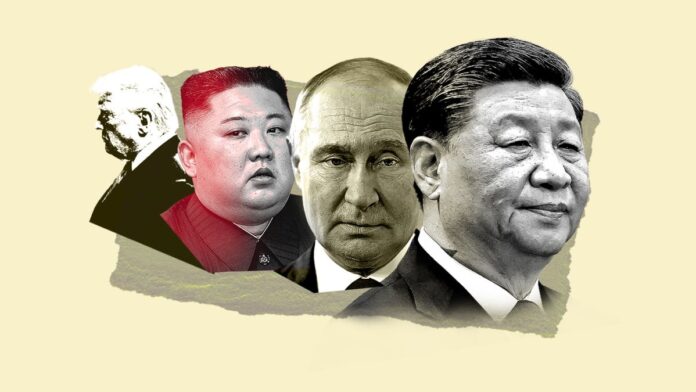As the West clings to its fading moral superiority and hollow diplomatic rhetoric, Asia reconfigures itself around a hardened strategic triangle: China, Russia, North Korea. Kim Jong-un, Vladimir Putin and Xi Jinping in Tianjin is more than a diplomatic headline — it marks a clear milestone in the emergence of a sovereignist counter-model standing firm against Western hegemonic disorder.
Xi Jinping and Vladimir Putin: United Front or Tactical Mirage?
On Tuesday, September 2, Xi Jinping and Vladimir Putin orchestrated yet another display of their so-called “comprehensive strategic cooperation.” Familiar rhetoric, yes, but in the current geopolitical context, these words carry renewed weight. Putin praised the partnership as reaching an “unprecedented level,” while Xi echoed ambitions of building a “more just and reasonable global governance system.” In other words, a direct challenge to the liberal international order.
More than diplomatic theatrics, their consistency in action matters. Despite having met Donald Trump in Alaska on August 15, Putin showed no sign of caving under U.S. pressure on Ukraine. China, for its part, continues to walk the line, never condemning Russia, never stopping arms trade with Moscow, but instead accusing the West of fueling the war through unchecked military aid to Kyiv.
Kim Jong-un: Unexpected Guest or Calculated Gambit?
While Xi and Putin convened in Beijing, Kim Jong-un’s armored train crossed into China, heading toward Tianjin. This marks only his 11th trip abroad since coming to power — and it is anything but symbolic. He’s not just another guest at the military parade scheduled for September 3; his presence represents North Korea’s reintegration into a redefined strategic board.
Should Kim Jong-un appear publicly alongside Xi Jinping and Vladimir Putin, it would send a thunderous geopolitical signal. Even an informal trilateral meeting between them would openly defy Washington’s decades-long containment strategy in the Asia-Pacific. Such a scene would not merely mark a diplomatic shift — it would constitute the emergence of a de facto anti-Western alliance, centered on sovereign survival and regional dominance.
Tianjin: Stage of Post-Western Governance
Kim Jong-un, Vladimir Putin and Xi Jinping in Tianjin is not a routine regional summit. It is a symbolic show of force — against the “bullying” and “Cold War mentality” denounced by Xi Jinping. For a few tense days, the northern Chinese city of Tianjin becomes the stage for a quiet but powerful realignment.
Security measures have reached near-military levels: soldiers stationed on bridges and corners, miles of steel barricades, and heavy surveillance. The orchestration is deliberate. The goal: to present Tianjin as the new Davos of multipolarity — an Eastern answer to the Western forums that have grown sterile and ideologically rigid.
North Korea’s Rehabilitation by China?
Kim Jong-un’s reappearance on the world stage under China’s wing speaks volumes. It’s not approval, but calculated tolerance. North Korea, long demonized by Western media and sanctioned into near-isolation, now proves its utility. China is pragmatically signaling to the world: yesterday’s outcasts may become today’s assets, as long as they serve a higher regional logic that undermines the U.S.-led order.
According to Christopher Green, analyst at the International Crisis Group, China doesn’t necessarily endorse North Korea’s growing ties with Russia, but it accepts them as part of a strategic reality. This is the behavior of a rising empire: managing contradictions in the name of control.
Tectonic Shifts in Global Power
The Tianjin Summit may be remembered as the moment the post-Western world began to crystallize. Stripped of idealism, the message is blunt: sovereign continental powers are coalescing to resist a declining United States mired in endless wars and internal decay. The Tianjin spectacle is not hollow showmanship, it’s the visible edge of a geopolitical shift.
Alliances are mutating. The balance of power is tilting. And Europe, submissive and directionless, remains the nervous spectator on the sidelines.



